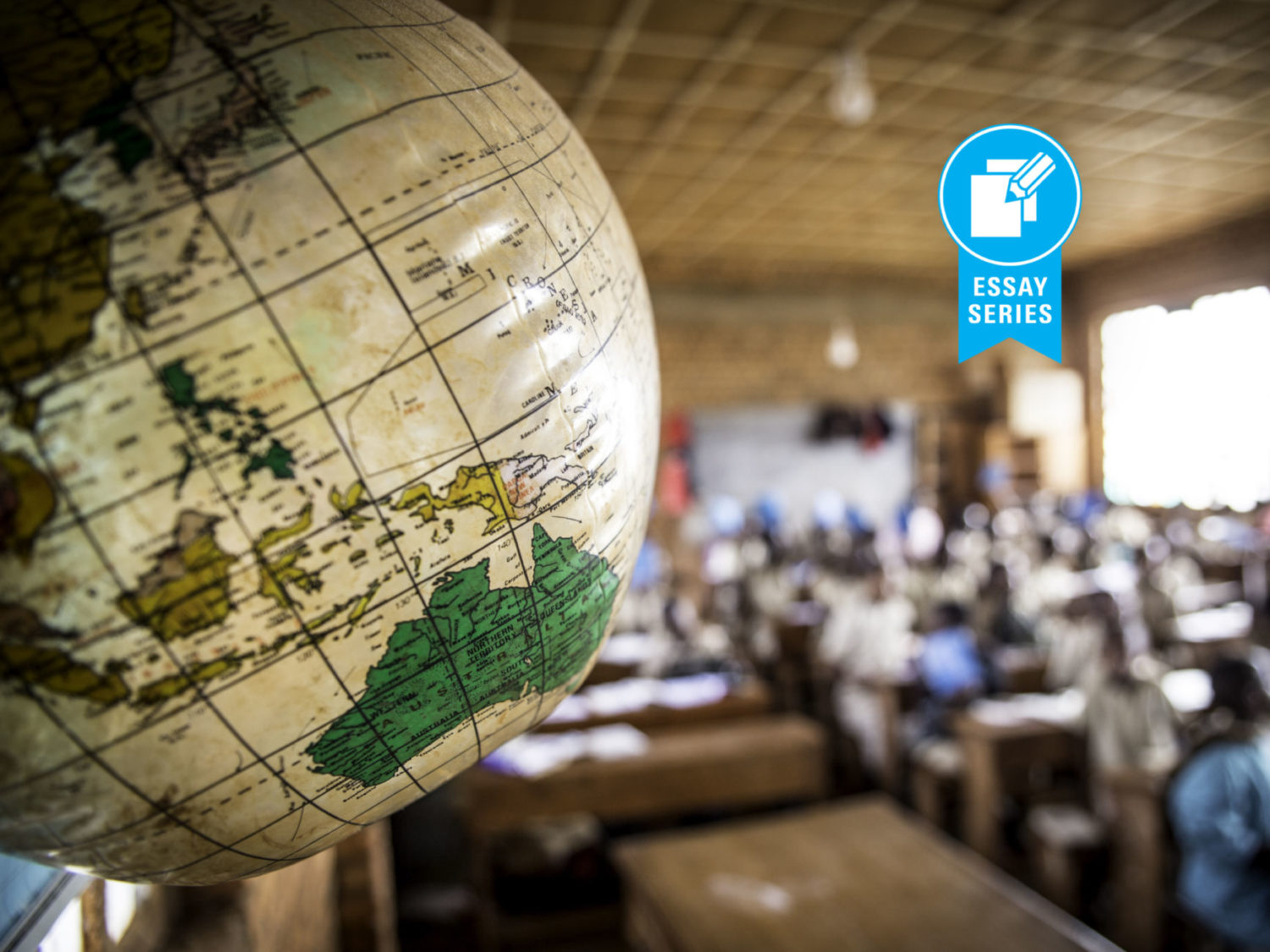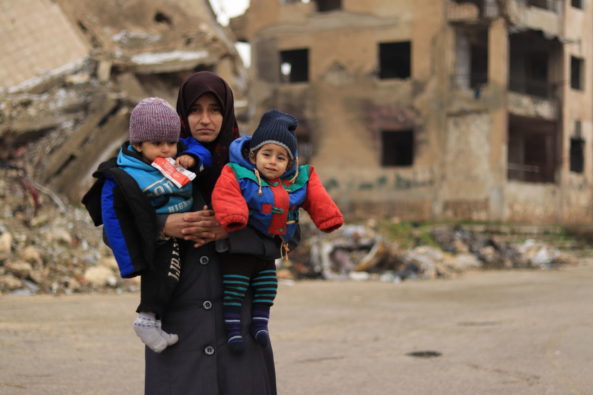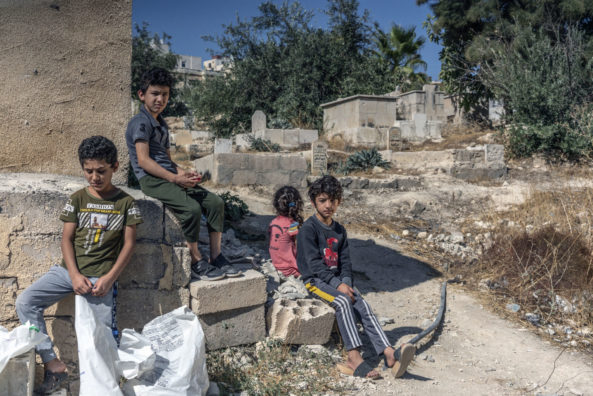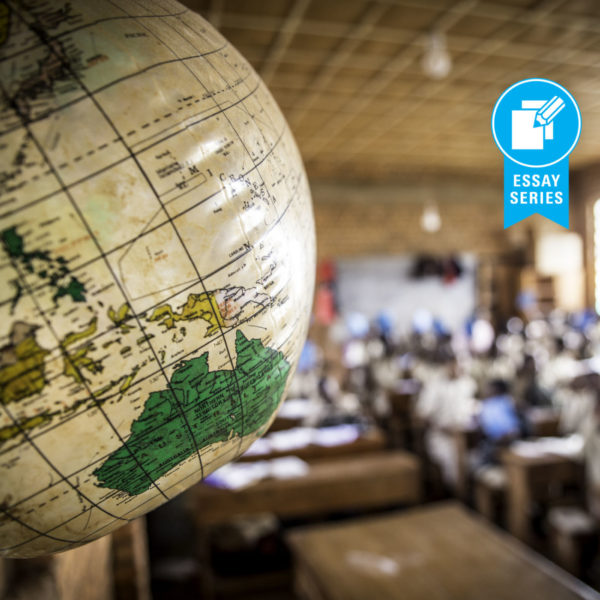
A humanitarian system for the protection of children
Here was I standing in the middle of rubble in Homs, and the deafening silence was unbearable. Suddenly a group of children, 10 maybe 15, came out the ruins pushing a big old bicycle towards me. I thought what they said in Arabic was to ask if I wanted to have a ride with them, and I was right. Their innocent inviting looks made me forget for a while everything I learned about humanitarian action in conflict zones, safety and security, priority emergency kits…etc.
These children looked hungry but did not ask for food. Some of them looked sick but did not ask for medicines. They wanted to ride a bike between the ruins of Homs, an expression of a silent cry for peace and normalcy. They wanted to ride a bike with me, an adult. They missed seeing and playing with grown-ups. They simply wanted to be children. So, here was I, brought back to the one Humanity we all share, riding a big old bike with children through the ruins of Homs.
Conflicts and emergency situations affect everybody. Once proud mothers and fathers lose everything overnight, including their identities, and become refugees, internally displaced persons, victims, beneficiaries of humanitarian assistance. These are not identities, but situations; situations in which anybody could find themselves because of circumstances beyond their control. These people appreciate the food, water, sanitation and hygiene; but the embarrassment you read in their eyes when they receive aid packages express a cry for peace and normalcy. They, the children of Homs, and all of us, care about the human treasure we have in common: our dignity. The preservation of humanity starts with the care, support and protection of children everywhere, particularly in most difficult and hardest-to-reach places, the so called last mile, where our first mile of response should start.
Today’s world is affected by many and severe shocks and hazards. They are more frequent, more severe and more protracted, and almost all man made. Lack of preparedness, early alert and early response turns climate and health hazards to disasters that always disproportionately affect women and children. These population groups must be safe from the start and their protection should not come as an afterthought. Forecast-based financing, prepositioning of nutrition and dignity supplies, child friendly and safe spaces, protection of learning facilities and continuation of education are indeed as life-saving as medical interventions. Nutrition programs will not only save lives in the short term but will prevent stunting and delayed cognitive development of children, and therefore becomes a strategic intervention for education. Education becomes more than numeracy and literacy but a means to foster reconciliation, tolerance and peace for children’s better future and to break the cycle of violence and revenge created by their parents’ generation. Indeed, caring for children in today’s traumatized world contributes to building a better future for us all.

We must build a movement for children based on partnerships, including between each generation and the next one; a legacy in our continuous chain of humanity.
This calls for responsible leadership and engaged citizenship to be on the side of people in need and to accompany them to find long-lasting solutions to their problems. First, political leadership is needed to stop the wars and conflicts that affect millions of children across the world. Too many conflicts are still enduring, even after decades, and finding no political solutions, and we can hardly remember when they started. That means the average time that refugees spend in camps is 18 years. How many children were born in Dadaab refugee camp and had to celebrate their 18th birthday there, if they make it to 18 at all? This is not a normal situation, and like the children of Homs, these children are crying for peace and normalcy. That cannot be achieved by humanitarian action. Guns must be silenced and peace must prevail. Political leaders must always remember that the United Nations charter starts with “we, the people” which in turn must surely begin with “we, the children”, illustrating perfectly our accountability to children and humanity.
Governments have the primary responsibility to care for their own citizens; but when our humanity is hurt, all must feel concerned and motivated to respond, to advocate for humanity, particularly when our values of civilization, solidarity, care and support helped to bring these Governments to power. Those values must continuously be championed in the multilateral system and translated in action to respond to children’s needs. When the world is looking to countries like the United Kingdom for more help, it is not necessarily because the UK owes it to the world but because of the values, the history and tradition the UK carries. The leadership of countries like the UK is needed now more than ever before as the world, and its children, are facing unprecedented challenges.
Global humanitarian needs are estimated at $35 billion in 2021, but only $17 billion have been mobilized, repeating the usual coverage of 40 to 50%. Humanitarian organisations are forced to compete for resources, creating fragmentation and only partial results in the field and, as ever, children are among the most vulnerable and hardest to reach, yet remain less supported. This increased vulnerability will fuel the cycle of violence and insecurity and create a real risk of a lost generation, a prospect that will further hurt our common humanity. In the Sahel, for example, years of neglect of children’s rights and needs have provided a fertile ground for extremist groups wherever education and hope for a better future are absent. Any investment in children in such fragile settings will reap a dividend in place of a curse. Furthermore, infrastructures and services for children may be the only thing divided populations have in common: their children going to the same school or gathering in the same child friendly spaces constitute seeds for a social capital to build on for greater cohesion, peace and development.

In this Year of Summits 2021, there could be no better vision for 'Global Britain' than to champion a renewed global commitment to children.
Lines between humanitarian and development responses are getting blurrier and blurrier, as crises are more protracted and shocks and hazards are more frequent. Children remain among the most vulnerable across that continuum, and responding to their needs should remain a priority across humanitarian, development and resilience building initiatives. Financing that response should be predictable, and at a scale and magnitude that matches the challenges children are facing in education, rights and protection, health, water, sanitation and hygiene. Such financing should not be seen as merely social expenditure but as investment that will bring multiple dividends: peace, social cohesion, health and a better future for all of humanity, wherever we live on the small planet we share. We must build a true movement for children through a long-term partnership between government, civil society and the private sector; a partnership between each generation and the next one; a legacy in our continuous chain of humanity.
Responding to children needs must be an indicator of accountability for every government, and active citizenship must be exercised to hold governments accountablefor the delivery of the children’s rights which already feature in international treaties and are signed-up to by every government. Parliamentarians must be the strongest advocates and guardians for the respect of these commitments for children, in their own societies and across the world, and ensure that funding for these commitments features in every year’s budgetary debates and allocations. UNICEF Country Offices and National Committees have a crucial role to play in nurturing such partnerships and in providing opportunities and safe spaces for citizens to be part of the movement. Voices of children must be carried by leaders and champions at all levels of society so that their rights and needs are considered right from the start and do not come as afterthoughts.
Such a movement is needed at all times, and more so in emergency and humanitarian settings where responses must be accelerated, scaled up and simplified. While UNICEF regular programmes must be fully funded, substantial provisions must be made to respond to emergencies, where always almost half of those affected are children. Children’s needs are usually included in UN emergency appeals; but, as stated above, the coverage rarely reaches over 50%. It is urgent to learn from other challenges such as climate change and pandemic preparedness and response, and strengthen/establish innovative mechanisms at national and global levels for a sustainable funded response to children needs, where speed, accountability and results will be balanced.
In this Year of Summits 2021, there could be no better vision for “Global Britain” than to champion a renewed global commitment to children through which, working together, the world could put in place the mechanisms and resources to build resilience and disaster preparedness, prevent and resolve conflicts, and act quickly and effectively to save lives and protect dignity and humanity whenever disaster strikes. Rather than leaving conflicts to fester and having to struggle anew to find the resources even for inadequate responses to eaxch new disaster, we should, and surely can, build a proactive humanitarian system centred on the protection of our children.
There is no better sign of global solidarity than to put a smile on face of every child everywhere, and the world can afford that. We call for a renewed commitment for children and a compact for hope, to prevent another lost generation and to heal the wounds already and today being inflicted on children and our humanity around the world. The cost of not doing so will be far far greater.
Please note that the views expressed in this essay are those of the author and do not necessarily represent the views of UNICEF UK.


